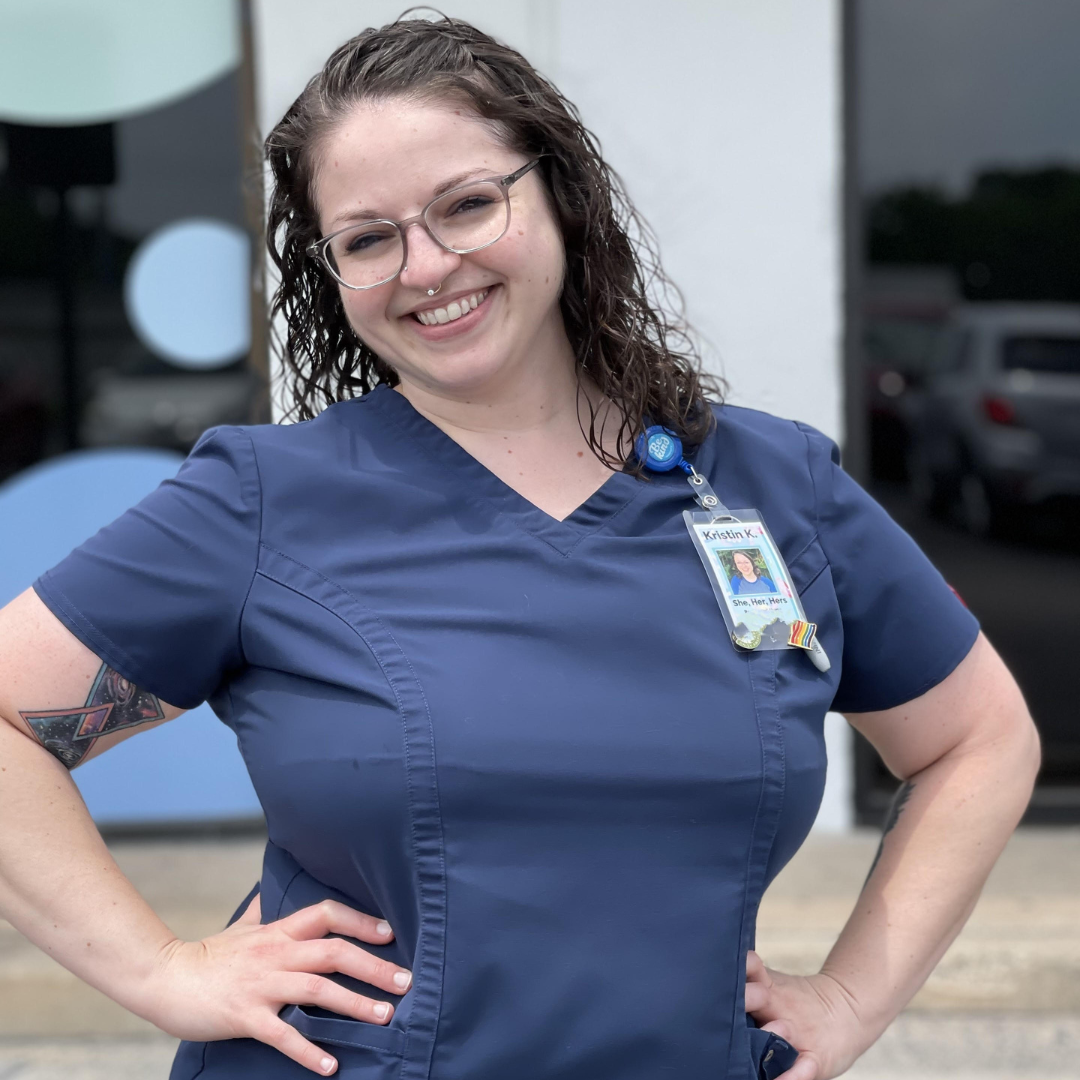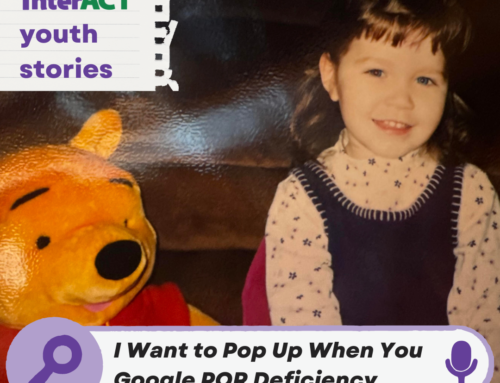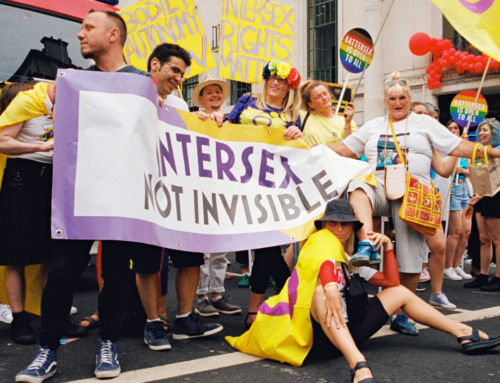By Kristin Keller, RN, BSN
(Note: This article contains discussion of medical abuse and sexual abuse.)
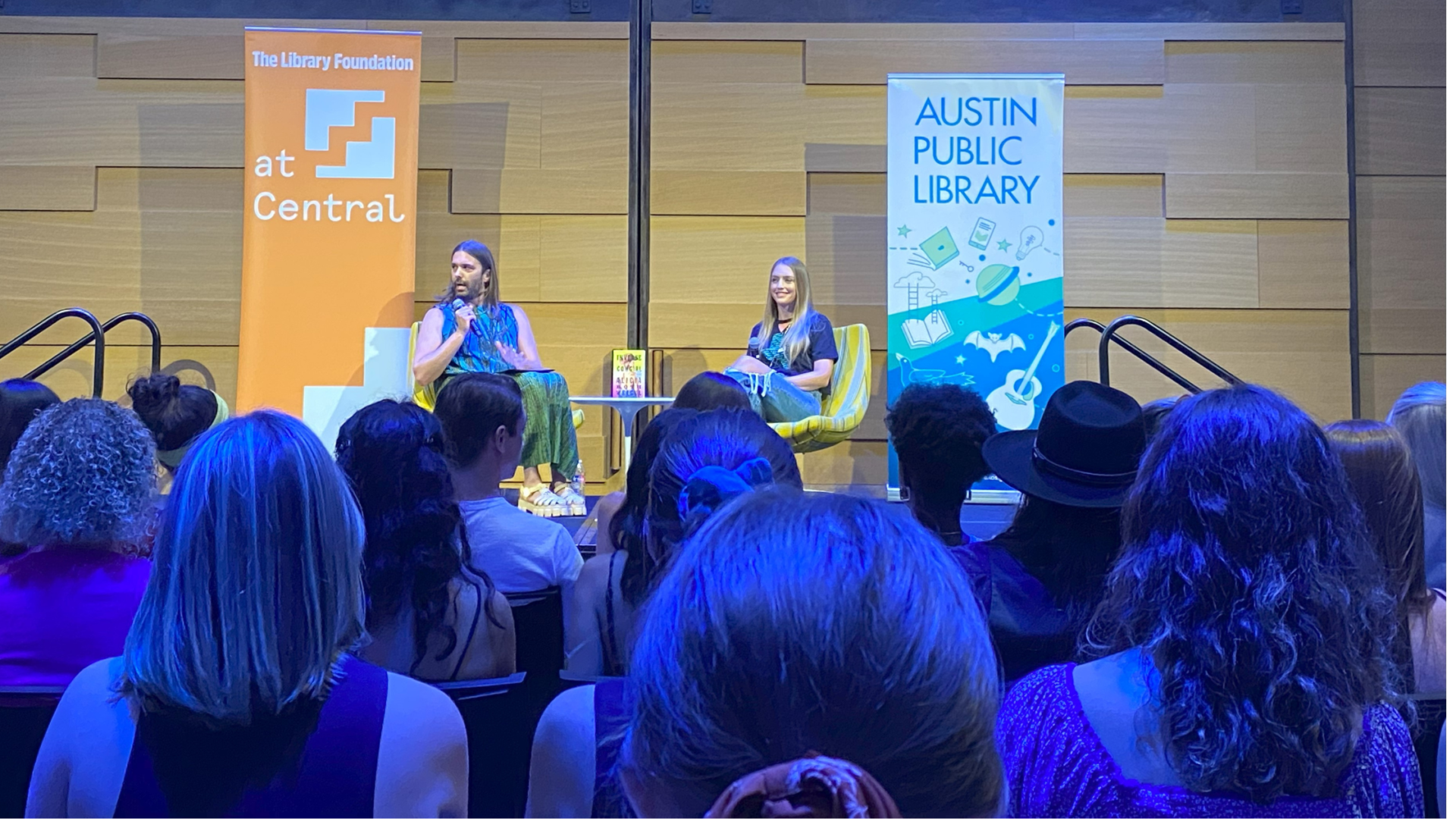
Kristin attends Alicia Roth Weigel’s book release event for Inverse Cowgirl moderated by JVN.
I worked as a nurse for over a decade—but it was only about two years ago that I fully understood the meaning of the word “intersex.” I was working at a sexual health clinic that specializes in LGBTQI+ care when I had an opportunity to hear Alicia Roth-Weigel speak about intersex rights.
At that point, I had been a practicing Registered Nurse for 13 years. I couldn’t understand how this term, intersex, hadn’t been brought to my attention before now. I had taken advanced courses of Anatomy and Physiology in high school and college; I have a Bachelor’s of Science in Nursing from a highly esteemed university’s nursing school. I’d taken care of adults in hospitals for ten years and in primary care clinics for years after that. I personally identify with the LGBTQI+ community! Why didn’t I know this – the meaning of the “I”?
The real meaning of the “I”
Intersex is an umbrella term for a host of variances in the sex characteristics that people can be born with, existing between society’s binary of “male” or “female”. While every intersex body is unique, there are over 40 diagnostic terms that are used to classify the variances that can be observed in a person’s chromosomes, hormones, external genitals, or internal organs.
Unfortunately for me, we didn’t cover any of this nuance in nursing school. If I had seen the words “Androgen Insensitivity Syndrome” listed in a patient’s medical history during those first ten years of my career, I might have quickly looked up the scientific definition without understanding the deeper meaning of it in regards to the person’s holistic picture. I now understand that some people are born with bodies that look differently because they have an immunity to androgens, including their own hormones, like testosterone.
More so than any clinical terminology, I wish I had understood that people born with intersex variations may have faced specific kinds of trauma simply because of being born intersex. They can face higher rates of of sexual abuse and abusive behaviors from an intimate partner.
I worked for a year as a Forensic Nurse in a clinic that specializes in providing care to survivors of domestic violence and sexual assault. I recall seeing the word “intersex” as a gender option for patients to select on their intake form, but since I lacked awareness of what intersex actually means, I potentially missed out on major context to my patient’s bigger picture. I was there specifically to serve survivors of abuse and I might have missed flags for opportunities to offer additional support, education, or referrals to resources.
Our intersex patients face medical harm
I have also come to understand how the Medical Establishment, a community I proudly belong to, has been one main perpetrator of violence, shame, and trauma inflicted upon the intersex population. I wanted to think I wasn’t part of the problem because I’d never worked with anyone with an intersex variation before. But we’ve all heard the statistic about the rate of people born with intersex variance being about the same as people born with red hair. And I know I’ve taken care of plenty of redheads in my time. I’ve cared for intersex patients and had never known it.
We weren’t taught in nursing school that the world of medicine can actually be a trauma machine that violates many people. Some people born with intersex variations don’t even know a life before experiencing medical trauma, because it starts the moment they’re out of the womb. Others experience it later in their childhood or pubescent years, but regardless of their age, medical trauma is a common thread in the fabric that connects so many intersex stories.
They are too often stories of being shamed, lied to, kept in secrecy about their own bodies, or treated like a test subject by a medical professional who is supposed to care for them and protect them. Realizing that I was part of the community responsible for so much pain and suffering was a really hard pill to swallow.
Intersex people aren’t finding affirming healthcare
In my nursing style, I pride myself on being a trauma-informed, empathetic, and safe provider for any person I care for. I prioritize healthcare equity, patient education and autonomy, and try to provide every one of my patients with access to all the information they need to make the best decision for themselves.
When I realized that intersex people are often born without control over what happens to their own bodies, it made me sick. I had no idea that there are barbaric surgical procedures still being performed on infants and children who cannot consent. Children born intersex may be told there is something wrong with their body that needs to be “managed” or “fixed” with medicine or surgery. I learned that intersex people can experience intense feelings of isolation and loneliness and lack the social support that we all need to thrive.
There are also gaping holes in the options for health care of intersex adults. As Alicia Roth Weigel reports, some intersex adults travel around the globe to find competent medical providers. Or, maybe more alarming, they are burdened with the task of educating their provider about the medical care they need. If I had known about intersex variations prior to becoming a practicing nurse, what differences could I have possibly made? Maybe just by being a supportive and affirming provider, knowledgeable enough to advocate for people whose bodies look or operate differently; to remind them that they are healthy and perfect as they are and don’t need to be “fixed”.
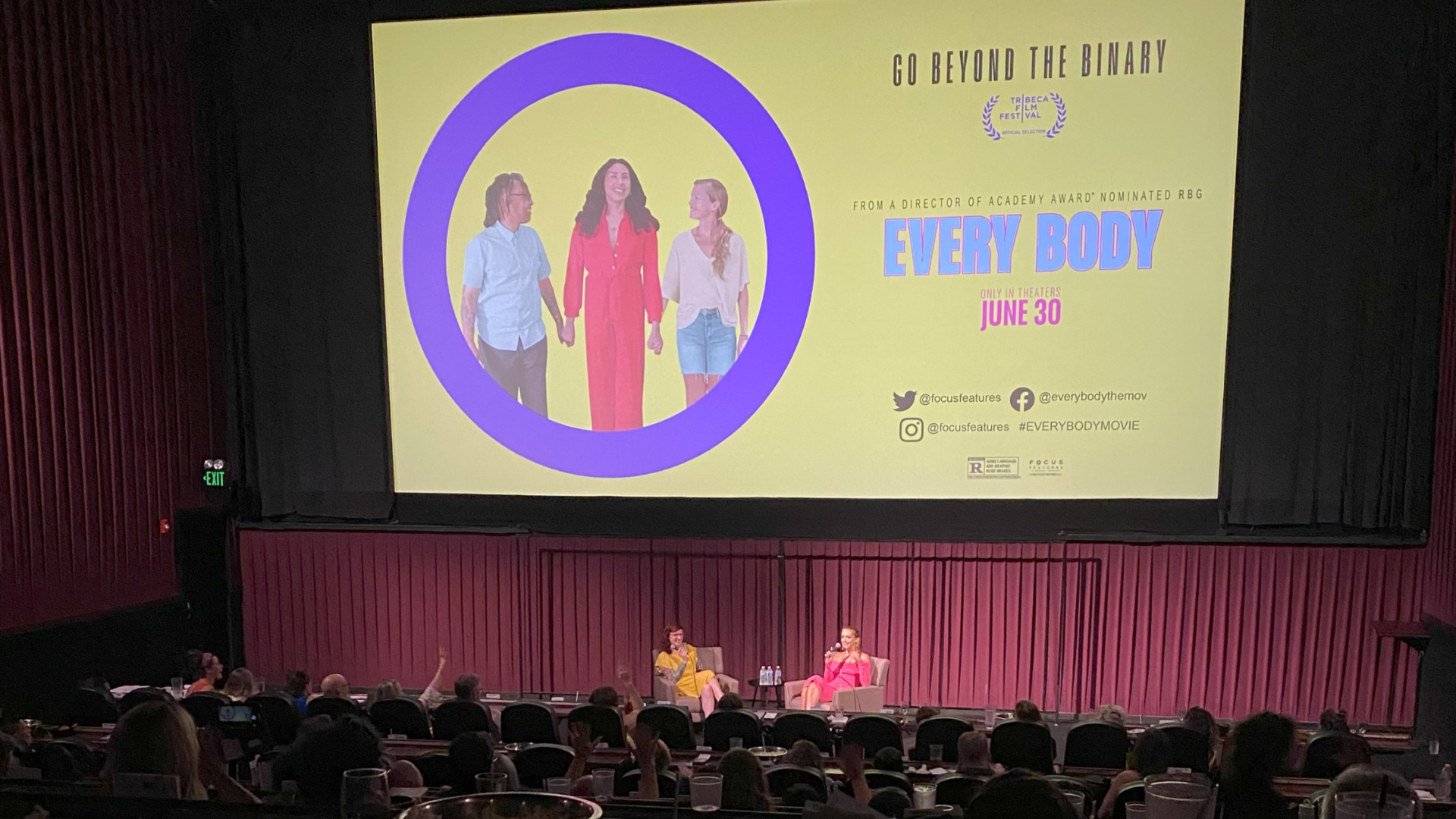
Kristin captures a photo at the Austin premiere of the documentary Every Body at Alamo Drafthouse.
Nurses can be part of the change
In the time since my eyes were opened to the intersex community, I have tried to do my part in joining the fight for their rights and increasing visibility and representation. I updated the language used on educational documents in my clinic so that they were more inclusive of the natural variances found among human bodies.
I’ve also focused on educating myself and exposing myself to intersex voices: I’ve read memoirs of some prominent intersex activists, attended the premiere of an intersex documentary, listened to podcasts, and attended talks to increase my exposure and alignment with the community. It’s important to me that their voices and stories are heard, and I want to be an audience and an amplifier for them. The more that nurses understand what it means to be an intersex person, the better job we can do in advocating for their rights and providing the best healthcare possible for every single patient we serve.
Nurses and other healthcare professionals can help foster a better relationship between the healthcare system and the intersex community by being more informed to the unique needs of intersex people. We should strive to protect their autonomy, safety, and comfort as we would with any patient in our care. While I do still find myself wondering about “what if” scenarios and what differences I could have made in the past had I been more educated, I do find motivation in how I can be a better ally for the intersex community going forward.
I’ve encountered many nurses just like myself who did not understand the complexity associated with the word intersex. In sharing my experience with other medical professionals, I hope to educate my peers and increase the visibility of intersex people from inside the industry. My hope in doing so is that all nurses will one day be better equipped to care for and advocate for patients with intersex identities.
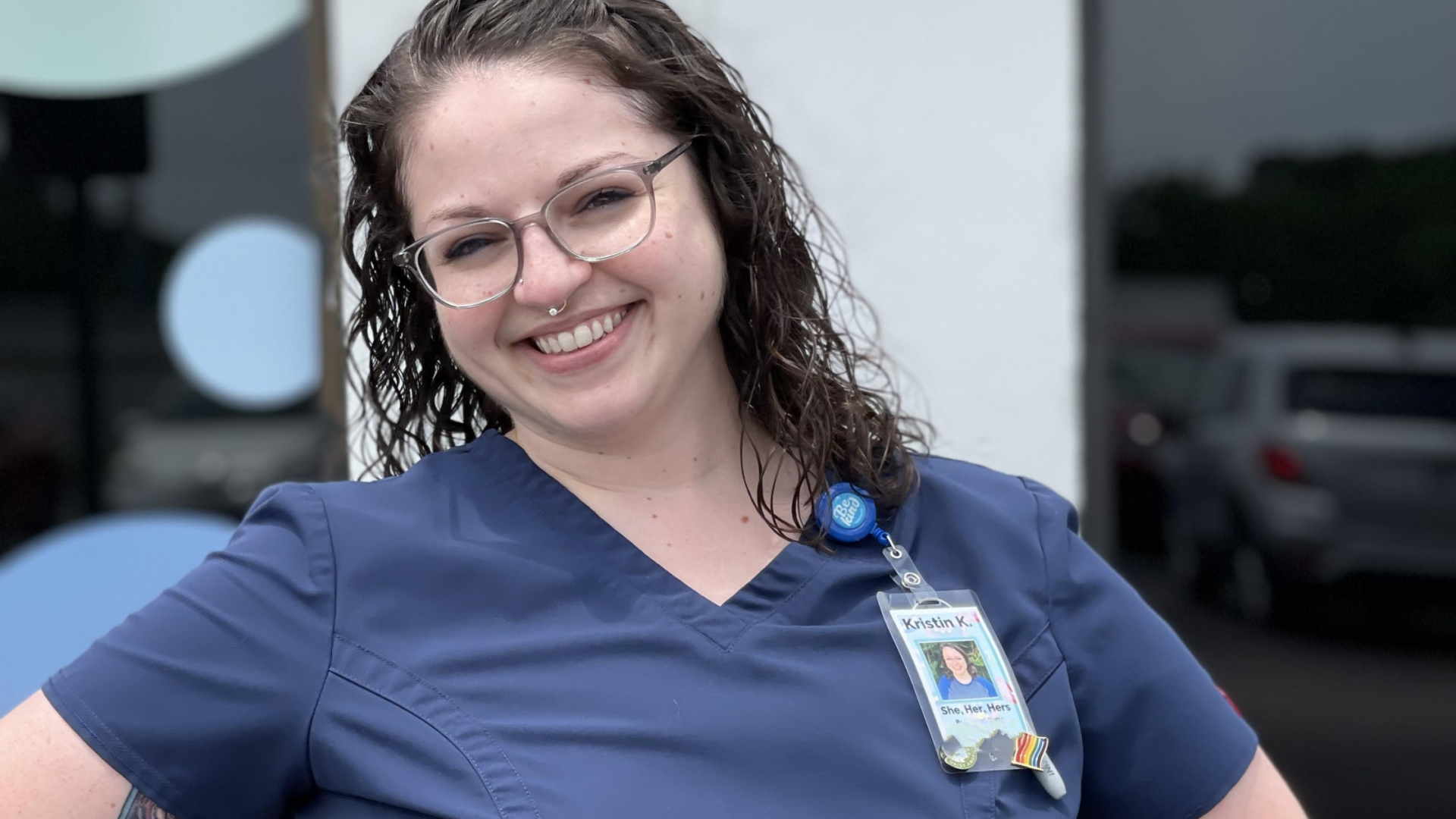
Kristin poses in scrubs during her time as a nurse.
Medical providers can start their journey to intersex education with our brochure What We Wish Our Doctors Knew, our Intersex Affirming Hospital Policy Guide with Lambda Legal, and Affirming Primary Care for Intersex People with the National LGBTQIA+ Health Education Center. Are you a medical student interested in supporting intersex people? Get in touch with us at [email protected].

